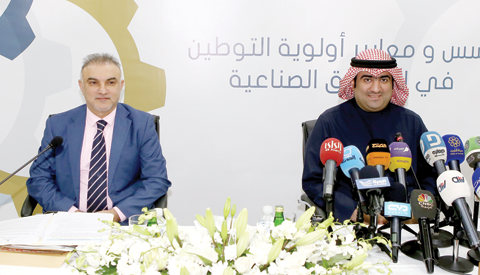1,036 blocks in Shadadiya to be given to applicants
 KUWAIT: Abdulkarim Taqi, General Manager of Public Authority for Industry and Minister of Commerce and Industry Khaled Al-Roudhan hold a press conference yesterday. — Photo by Yasser Al-Zayyat
KUWAIT: Abdulkarim Taqi, General Manager of Public Authority for Industry and Minister of Commerce and Industry Khaled Al-Roudhan hold a press conference yesterday. — Photo by Yasser Al-ZayyatKUWAIT: Minister of Commerce and Industry Khaled Al-Roudhan announced the adoption of new standards for the distribution of industrial land by the board of directors of the Public Authority for Industry. He disclosed that 1,036 industrial blocks will be distributed in the coming months according to these standards.
Roudhan said at a press conference held yesterday at PAI that the new standards and the evaluation of the industrial projects will be based on three basic criteria: Industrial capital, which means the size of the capital used in technology, machinery and equipment, in addition to the volume of energy used to operate the plant. This will form 20 percent of the total standards. Industrial priority of the quality of investment and products makes up 30 percent.
The third criterion is value added to the national economy, which includes the volume of profits to be achieved in addition to the size of national manpower working in the project and its service to other local projects, as well as the actual production volume. He said this standard will have 50 percent weightage of the total distribution standards.
Roudhan said the distribution of the 1,036 industrial blocks will be in the Shadadiya industrial area, adding that it will contribute to enhancing the role of the industrial sector in Kuwait to diversify sources of income and increase domestic output. He announced plans to encourage upgrading the quality of existing and future factories.
Roudhan said the blocks will be distributed to entrepreneurs who meet the new settlement criteria so that Kuwaiti industrial products can compete globally. "It is not enough for our industry to be for domestic consumption only. Without exports, the industry will not work for the economy," he said. "We will seek to contribute to the new industries to reduce imports of some basic products. The local products should be of competitive quality and exportable quantities that can be sold in world markets and achieve self-sufficiency in crises," he added.
He pointed out that the new criteria for settlement in the new industrial zones were meant to give a great push to PAI to work more freely and quickly to achieve basic objectives, including the increase in exports, providing real job opportunities acceptable to Kuwaitis, diversification of products and focusing on global competitiveness. "We have formed a team that has set a timetable for approval of projects with feasibility studies. It started work three months back and is expected to disband at the end of March and start the actual distributions after approval," Roudhan explained.
Abdulkarim Taqi, General Manager of PAI, said the first criterion in the new standards is industrial capitalism, which is divided into two parts: Energy conservation, because energy is subsidized and depends on a depleting resource, so saving it will bring great benefits to the economy. It has 50 percent weightage. Machines and equipment out of the total number of productive labor forms the other 50 percent in order to reduce dependence on unskilled labor and encourage dependence on trained labor and thus provide jobs for Kuwaitis.
The second standard (industrial priority) is that it is distributed in four bases: Recycling waste from manufacturing operations (5 percent weightage), 40 percent for export products, 20 percent for products for the local market that replace imports and 35 percent for medicine and technology products.
The third criterion (value added to the national economy) will be divided into five sections - 20 percent weightage for profitability of trade, 15 percent for national employment, 20 percent to use local raw materials and feed the product to other factories, 25 percent for product made for the first time and 20 percent for products that will replace imports.
Taqi said the technical team adopted a timeframe for project approvals, starting by sorting applications at the sector level, then approvals of feasibility studies, followed by applying the criteria to these approvals to get the preliminary results. He said applicants will be interviewed to explain the project, announcing that a committee will be formed by MoCI and PAI in the event of any objections.
By Faten Omar










